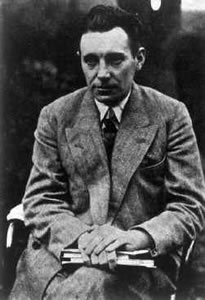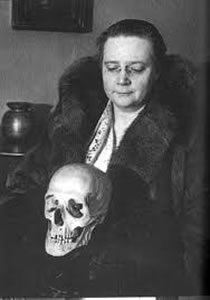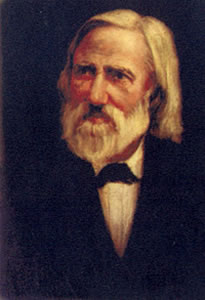De Vlaamse schrijver Lode Zielens werd geboren in Antwerpen op 13 juni 1901. Zie ook mijn blog van 13 juni 2007 en ook mijn blog van 13 juni 2009 ook mijn blog van 13 juni 2010.
Uit: Forebon
“De meneer, die dezen Zaterdag namiddag even voor drie uur in de Antwerpsche tram zit – lijn 12, naar het Gerechtshof – is inderdaad de griffier Forebon. Of wilt ge hem Bonfore noemen? Hij leest, hij leest zelfs zeer aandachtig, wat inderdaad zeldzaam is bij een griffier, veeleer gewoon dossiers vluchtig door te nemen. De griffier is dus geheel in zijn lectuur verdiept. Hij merkt de halten niet op; klein zit hij, in schraalheid gedoken; dit zelf opgelegd bewuste, dit eigenhandig aangekweekte besef van zelfwaardigheid zijn totaal weg. Het is of de griffier op zijn beurt met iemand wordt geconfronteerd en deze confrontatie hem niet gunstig uitvalt. Met een zekere gejaagdheid, bijna drift te noemen, slaat hij de bladzijden van het boek om.
Achter, op het balcon houdt zich de onderzoeksrechter Ange op. Zoo aanstonds zullen zij als zijde aan zijde zitten, in éénzelfde kabinet, den zooveelsten dag van het zooveelste jaar. Ange zal zwijgend spreken en de griffier zwijgend luisteren. Beiden zullen verdwijnen in het duister van dit rommelige vertrek, zoo goed als opgelost in de vuile lucht daarvan en in het grijze stof, er zal niets anders wezen als de blik van Ange. Die blik: een bliksemend rapier. Wie hem ondergaat is getroffen vóór hij het zich bewust kan zijn. Even klein van gestalte als de griffier is de onderzoeksrechter. Gemeten is zijn stap, de handen houdt hij altijd ergens verdoken, opdat geen trilling zou verraden wat het brein doorwoelt en besluit. Even onaanzienlijk is het fletse gelaat, zoo goed als onopmerkelijk, vuns en bleek.“

De Engelse schrijfster, dichteres en vertaalster Dorothy Leigh Sayers werd geboren op 13 juni 1893 in Oxford. Zie ook mijn blog van 13 juni 2007 en ook mijn blog van 13 juni 2009 en ook mijn blog van 13 juni 2010.
Uit: Thrones, Dominations
“I do not,” said Monsieur Théophile Daumier, “understand the English.”
“Nor does anybody,” replied Mr. Paul Delagardie, “themselves least of all.”
“I see them pass to and fro, I observe them, I talk to them—for I find it is not true that they are silent and unfriendly—but I remain ignorant of their interior life. They are occupied without ceasing, but I do not know the motives for the things they so energetically do. It is not their reserve which defeats me, for often they are surprisingly communicative; it is that I do not know where their communicativeness ends and their reserve begins. They are said to be rigidly conventional, yet they can behave with an insouciance without parallel; and when you question them, they appear to possess no definable theory of life.”
“You are quite right,” said Mr. Delagardie. “The English are averse to theories. Yet we are, for that reason, comparatively easy to live with. Our conventions are external, and easily acquired; but our philosophies are all individual, and we do not concern ourselves to correct those of others. That is why we permit in our public parks the open expression of every variety of seditious opinion—with the sole proviso that nobody shall so far forget himself as to tear up the railings or trample on the flowers.”
“I beg your pardon; I had for the moment forgotten that you also were English. You have so much the outlook, as well as the accent of a Frenchman.”
“Thank you,” replied Mr. Delagardie. “I am actually only one-eighth French by blood. The other seven-eighths is English, and the proof is that I take what you have said as a compliment. Unlike the Jews, the Irish and the Germans, the English are pleased to be thought even more mongrel and exotic than they are. It appeals to the streak of romantic sensibility in the English temperament. Tell an Englishman that he is pure-bred Anglo-Saxon or a hundred per cent Aryan, and he will laugh in your face; tell him that his remote ancestry contains a blend of French, Russian, Chinese or even Arab or Hindu, and he will listen with polite gratification. The remoter, of course, the better; it is more picturesque, and less socially ambiguous.”

De Engelse schrijfster Frances „Fanny“ Burney werd geboren op 13 juni 1752 in King’s Lynn, Norfolk. Zie ook mijn blog van 13 juni 2007 en ook mijn blog van 13 juni 2009 ook mijn blog van 13 juni 2010.
Uit: Camilla Or A Picture Of Youth
“REPOSE is not more welcome to the worn and to the aged, to the sick and to the unhappy, than danger, difficulty, and toil to the young and adventurous. Danger they encounter but as the forerunner of success; difficulty, as the spur of ingenuity; and toil, as the herald of honour. The experience which teaches the lesson of truth, and the blessings of tranquillity, comes not in the shape of warning nor of wisdom; from such they turn aside, defying or disbelieving. ‘Tis in the bitterness of personal proof alone, in suffering and in feeling, in erring and in repenting, that experience comes home with conviction, or impresses to any use.
In the bosom of her respectable family resided Camilla. Nature, with a bounty the most profuse, had been lavish to her of attractions; Fortune, with a moderation yet kinder, had placed her between luxury and indigence. Her abode was in the parsonage-house of Etherington, beautifully situated in the unequal county of Hampshire, and in the vicinity of the varied landscapes of the New Forest. Her father, the rector, was the younger son of the house of Tyrold. The living, though not considerable, enabled its incumbent to attain every rational object of his modest and circumscribed wishes; to bestow upon a deserving wife whatever her own forbearance declined not; and to educate a lovely race of one son and three daughters, with that expansive propriety, which unites improvement for the future with present enjoyment.
In goodness of heart, and in principles of piety, this exemplary couple was bound to each other by the most perfect unison of character, though in their tempers there was a contrast which had scarce the gradation of a single shade to smooth off its abrupt dissimilitude. Mr. Tyrold, gentle with wisdom, and benign in virtue, saw with compassion all imperfections but his own, and there doubled the severity which to others he spared. Yet the mildness that urged him to pity blinded him not to approve; his equity was unerring, though his judgment was indulgent.”

De Duitse schrijver en psychiater Heinrich Hoffmann werd geboren op 13 juni 1809 in Frankfurt am Main. Zie ook mijn blog van 13 juni 2010.
Die Geschichte vom fliegenden Robert
Wenn der Regen niederbraust,
Wenn der Sturm das Feld durchsaust,
Bleiben Mädchen oder Buben
Hübsch daheim in ihren Stuben. –
Robert aber dachte: Nein!
Das muß draußen herrlich sein! –
Und im Felde patschet er
Mit dem Regenschirm umher.
Hui, wie pfeift der Sturm und keucht,
Daß der Baum sich niederbeugt!
Seht! den Schirm erfaßt der Wind,
Und der Robert fliegt geschwind
Durch die Luft so hoch, so weit;
Niemand hört ihn, wenn er schreit.
An die Wolken stößt er schon,
Und der Hut fliegt auch davon.
Schirm und Robert fliegen dort
Durch die Wolken immerfort.
Und der Hut fliegt weit voran,
Stößt zuletzt am Himmel an.
Wo der Wind sie hingetragen,
Ja! das weiß kein Mensch zu sagen.

